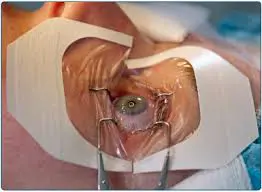If you are considering eye surgery to correct your vision, you have a lot of options to choose from. There are many different types of procedures available, and it can be difficult to decide which one is right for you. In this blog post, we will discuss the different types of eye surgery available and help you decide which procedure is best for you!
Contents
Types Of Eye Surgery To Correct Vision
 Eye surgery to correct vision is an increasingly popular option for those who are looking to improve their eyesight. There are a number of different types of procedures that can be performed, and it is important to choose the right one for your needs.
Eye surgery to correct vision is an increasingly popular option for those who are looking to improve their eyesight. There are a number of different types of procedures that can be performed, and it is important to choose the right one for your needs.
Because each type of surgery has its own risks and benefits, it is important to consult with an experienced eye surgeon to determine which procedure is right for you. Here are some of the most common types of eye surgery to correct vision:
LASIK
This is the most common type of eye surgery to correct vision, and it is also the most popular. LASIK involves the use of a laser to reshape the cornea, which is the clear, outer layer of the eye. This procedure can correct a wide range of vision problems, including nearsightedness, farsightedness, and astigmatism.
More often, Lasik is performed on an outpatient basis, which means that you will be able to go home the same day as your surgery. The recovery time for this procedure is typically very short, and most people experience little to no discomfort after the surgery. It offers so many benefits, which is why it continues to be the most popular type of vision correction surgery.
PRK
PRK, or photorefractive keratectomy, is very similar to LASIK in that it also uses a laser to reshape the cornea. However, with PRK, the surgeon will first remove the surface layer of the cornea (the epithelium) before performing the laser treatment. This means that PRK can be used to treat a wider range of vision problems than LASIK, but it also comes with a longer recovery period.
It is believed that PRK may be a better option for those with thin corneas or large pupils, as there is less risk of complications associated with these factors. PRK may also be a good choice for people who are at a higher risk for developing dry eye syndrome after surgery, as there is no need to create a corneal flap.
If you are considering PRK, be sure to discuss the pros and cons with your surgeon to see if it is the right option for you.
Corneal Transplant
In some cases, eye surgery to correct vision may involve a corneal transplant. This is typically only an option when other forms of surgery are not possible or have not been successful. A corneal transplant is a very serious surgery with a long recovery time, so it is not something to be undertaken lightly.
You will need to discuss this option with your doctor and make sure you are fully informed before making a decision. Also, this type of surgery is not always successful, so you will need to be prepared for the possibility that your vision may not be completely corrected.
Cataract Surgery
 Cataracts are a common cause of vision problems, and cataract surgery is one of the most commonly performed types of eye surgery. This procedure involves removing the cloudy lens from your eye and replacing it with a clear artificial lens.
Cataracts are a common cause of vision problems, and cataract surgery is one of the most commonly performed types of eye surgery. This procedure involves removing the cloudy lens from your eye and replacing it with a clear artificial lens.
Cataract surgery is usually safe and effective, but like any surgery, there are some risks involved. These risks include infection, bleeding, or damage to the eye. It is usually an outpatient procedure, which means you won’t have to stay in the hospital overnight.
IOL Implants
Another type of eye surgery to correct vision is an IOL implant. IOLs, or intraocular lenses, are tiny implants that are placed in the eye during cataract surgery. IOLs can also be used to treat other conditions, such as presbyopia. Because in these conditions, the vision seems to get progressively worse.
IOL implants can be made of different materials, including plastic, silicone, or acrylic. They come in different shapes and sizes, and they can be clear or tinted. The type of IOL implant that’s right for you will depend on your individual needs and preferences.
So these are a few common types of eye surgery to correct vision. If we talk in general, all these surgeries are done to improve the focusing power of your eye. And help you see more clearly. Thus, before choosing any type of surgery, be sure to know the reason behind vision loss, and what exactly the surgery entails. With this knowledge in hand, you and your doctor can choose the best option for you.
Is Vision Correction Surgery Painful?
The short answer is no, vision correction surgery is not painful. The majority of patients report only mild discomfort during the procedure, which lasts less than 30 minutes. Some patients may experience temporary watering of the eyes or light sensitivity immediately after surgery, but these side effects typically resolve within a few days.
It is also important to note that vision correction surgery is a very safe procedure. Complications are rare, and most patients experience excellent results. However, as with any surgery, there is always a small risk of complications.
Overall, vision correction surgery is a very safe and effective way to improve your vision. If you are considering this procedure, be sure to consult with an experienced eye surgeon to discuss your specific situation and find out if vision correction surgery is right for you.
Does Lasik Last Forever?
 Before you commit to any kind of vision correction surgery, you probably want to know how long the results will last. Unfortunately, there is no definitive answer to this question.
Before you commit to any kind of vision correction surgery, you probably want to know how long the results will last. Unfortunately, there is no definitive answer to this question.
LASIK is currently the most popular type of refractive surgery. It involves using a laser to correct your vision. LASIK can be used to treat nearsightedness, farsightedness, and astigmatism.
The results of LASIK are usually pretty long-lasting. In fact, most people who have the procedure will have stable vision for at least a decade. However, it’s possible that you may need to have a touch-up procedure at some point down the road.
But if we compare Lasik to other types of vision correction surgery, such as PRK or implantable contact lenses, Lasik usually has longer-lasting results. Because this type of eye surgery to correct vision is less invasive, there is typically less risk of complications.
Of course, no type of vision correction surgery is 100% guaranteed to last forever. Your eyesight may change over time due to age, disease, or injury. But if you’re considering having vision correction surgery, Lasik is probably your best bet in terms of getting long-lasting results.
How Successful Is Eye Surgery To Correct Vision?
If we talk about each type of eye surgery to correct vision, the success rates are as follows:
- LASIK has a 96% success rate
- PRK has a 94% success rate
- LASEK has a 92% success rate
These percentages mean that out of every 100 people who have the surgery, 96 will have 20/20 vision or better. The success rate of any type of eye surgery depends on many factors. These include:
- The skill of the surgeon
- The type of procedure chosen
- The health of the patient’s eyes
- Patient compliance with post-operative instructions
It is believed that about 98% of all patients who have laser vision correction surgery are satisfied with the results. All in all, eye surgery to correct vision is considered to be successful. But before considering any type of surgery, make sure to consult with a professional for a clear understanding.
Limitations Of Eye Surgery
 Sometimes there are limitations to what eye surgery can accomplish. For instance, if your vision problems are caused by cataracts, you may not be a good candidate for LASIK. This is because LASIK permanently changes the shape of your cornea, and cataracts cause a clouding of the natural lens inside your eye—removing the cataract may improve your vision, but it won’t change the shape of your cornea.
Sometimes there are limitations to what eye surgery can accomplish. For instance, if your vision problems are caused by cataracts, you may not be a good candidate for LASIK. This is because LASIK permanently changes the shape of your cornea, and cataracts cause a clouding of the natural lens inside your eye—removing the cataract may improve your vision, but it won’t change the shape of your cornea.
In other cases, you may not be a good candidate for a particular type of surgery because of the health of your eyes. For instance, people with autoimmune diseases or certain infections may not be able to have LASIK. This is because LASIK involves using a laser to make a very precise cut on the cornea, and people with these conditions may heal more slowly or may be more susceptible to infection.
There are also some vision problems that can’t be corrected with surgery. For instance, if you have amblyopia (lazy eye), surgery won’t improve your vision. Amblyopia is a condition in which the nerve pathway from the eye to the brain isn’t fully developed, so surgery can’t correct it.
Before you decide to have surgery, be sure to talk to your doctor about all of your options and what type of surgery is right for you.
Surgery isn’t the only way to improve your vision. For instance, if you have mild nearsightedness, you may be able to correct your vision with contact lenses or glasses. Or, if you have presbyopia (age-related farsightedness), reading glasses may help you see better. So, choose the option that’s best for you.
Tips To Choose The Right Surgery For You
This is an important decision. Here are some factors to keep in mind as you make your choice:
- Your age
- The severity of your refractive error
- Your lifestyle
- Your occupation
If you have a mild refractive error, LASIK surgery may be a good option for you. This type of surgery is very effective and has a short recovery time. If you have a more severe refractive error, you may need to consider other types of surgery, such as PRK or LASEK.
Age is an important factor to consider when choosing eye surgery. If you are over the age of 40, you may not be a good candidate for LASIK surgery. This is because your eyesight will continue to change as you age, and LASIK surgery cannot be repeated.
If you have a different lifestyle, you may need to consider different surgery. For instance, if you are a contact lens wearer or have had previous eye surgery, then the surgery type may be different for you. Similarly, cccupation impacts the type of surgery for you.
Therefore, you must keep all these factors in mind before making a decision about the best eye surgery for you. Talk to your doctor about all your options and make sure you are comfortable with the procedure you choose.
Conclusion
In conclusion, eye surgery to correct vision is an extremely important decision. There are a variety of procedures available and it is essential to consult with an experienced eye surgeon to determine which procedure is right for you. With the advances in technology, there has never been a better time to consider surgery to improve your vision.
For more information and guidance, please reach out to Eye Mantra. EyeMantra offers the most advanced eye surgery options including PRK, Femto Lasik, SMILE surgery, Standard Lasik, and Contoura vision. If you have any questions on Lasik surgery, Lasik surgery cost, and Lasik procedure, call us at +91-9711116605 or email at [email protected].


